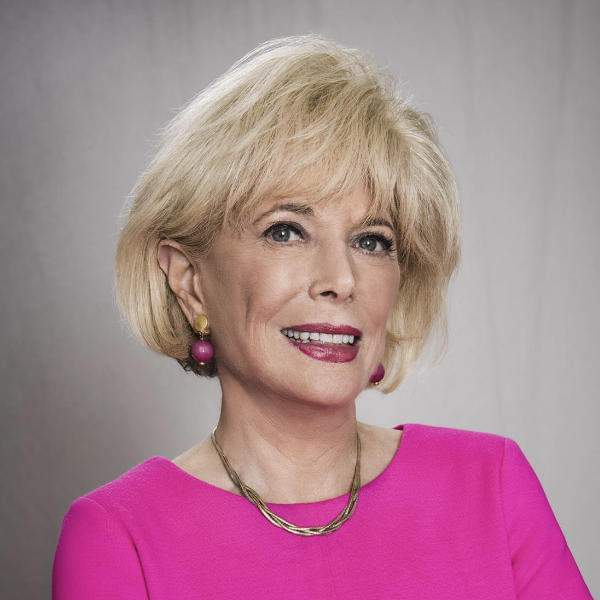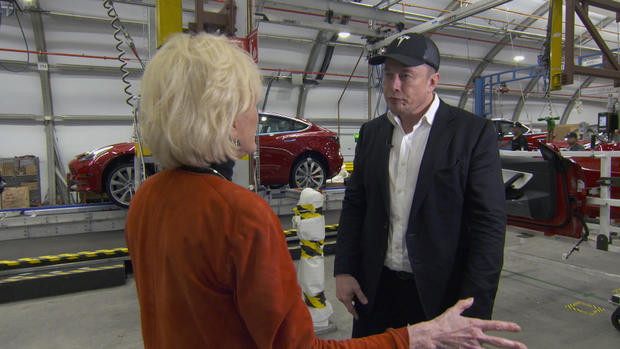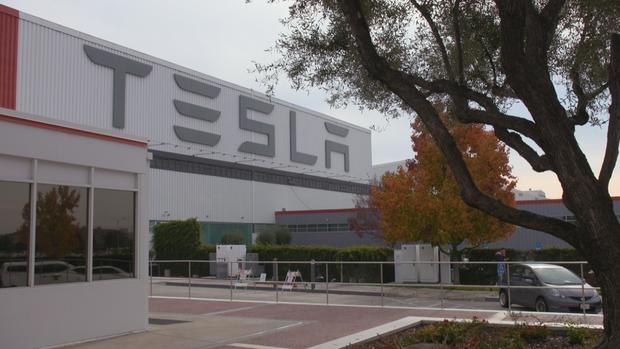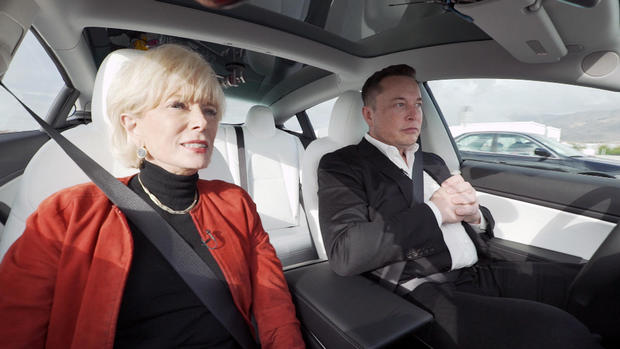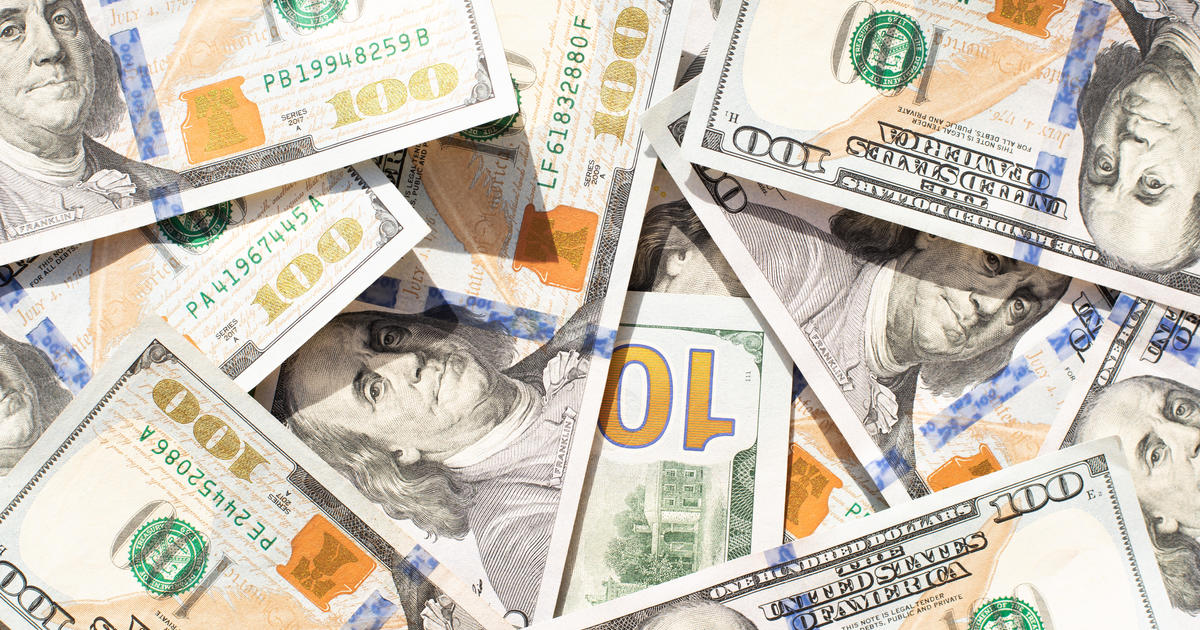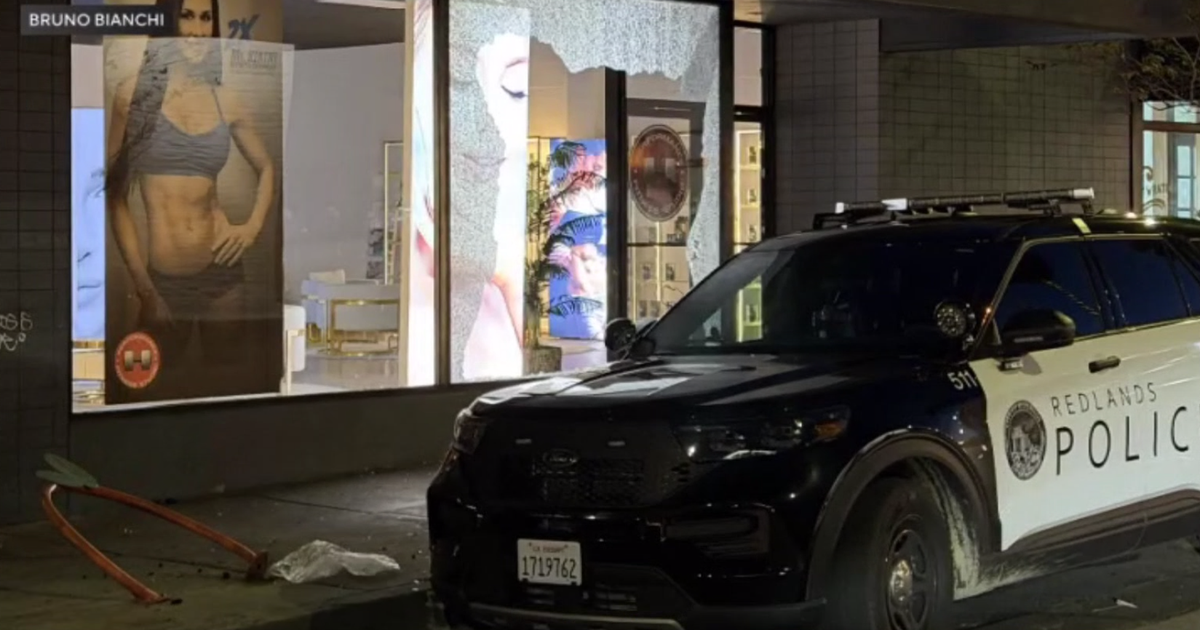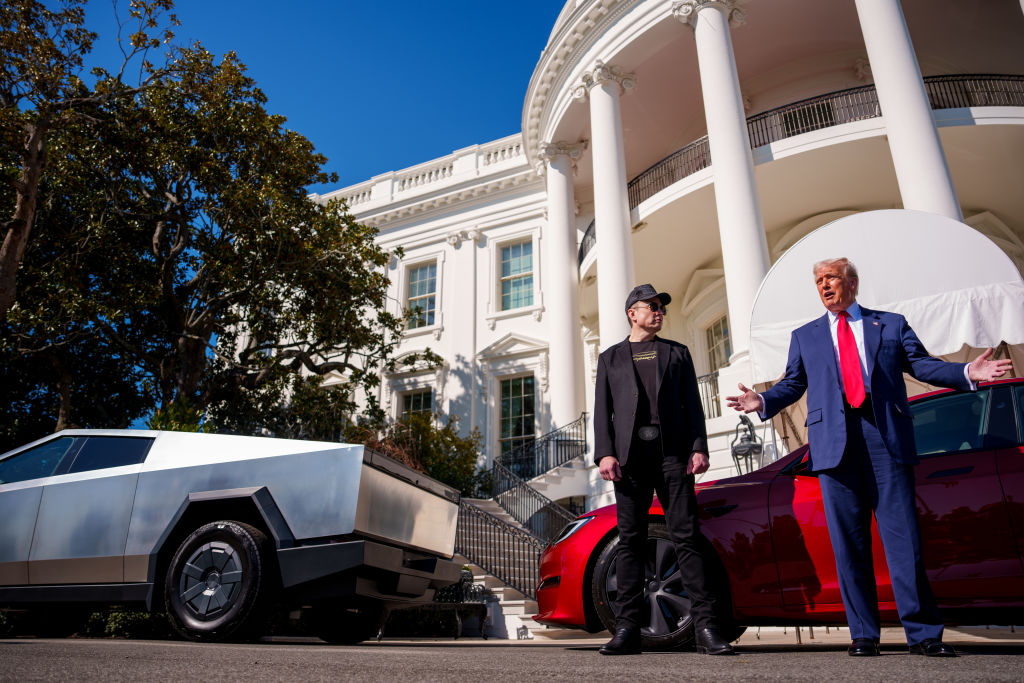Tesla CEO Elon Musk: The 60 Minutes Interview
Elon Musk, the CEO of the electric car company Tesla, has been called a genius, a visionary. But this year he got less noticed for his brilliance than his behavior, with stories about self-inflicted wounds: like capricious tweeting and public pot smoking. The 47-year-old billionaire has said 2018 has been "excruciating," "the most… painful year of my career."
When he joined as co-founder of the company 14 years ago, he had no experience in the auto industry. He was guided by a dream: to build cars that don't harm the environment in an effort to save the planet. But this year Musk had to save his company. Tesla had been losing money for nearly its entire existence, its debt is in the billions, and it was bleeding cash. Everything was riding on its ability to mass produce its new sedan: the Model 3, an affordable so-called "everyman" car.
But over the summer, when Elon Musk was in "production hell," as he called it, working round the clock to make enough Model 3s to show a profit, he began acting, well, weird.
Lesley Stahl: There are people who say that the company cannot survive without you. And--
Elon Musk: Oh, I don't think that's true. Yeah.
Lesley Stahl: --there are people who say the company cannot survive with you.
Elon Musk: Hah hah. That's hilarious.
Lesley Stahl: They say it's because of the way you acted over the summer doing things that seemed impulsive, un-CEO-ish?
Elon Musk: Well, first of all, I, I am somewhat impulsive. And I didn't really want to try to adhere to some CEO template.
Well, he certainly accomplished that. Especially this past year when he began picking needless fights on social media. He called a diver of the Thai cave rescue a "pedo" as in pedophile. He sold 20,000 flamethrowers online and he smoked weed during a podcast.
Lesley Stahl: What about the pot?
Elon Musk: I do not smoke pot, as anyone who watched that podcast could tell, I have no idea how to smoke pot. Or anything. I don't know to smoke anything, honestly.
Lesley Stahl: Here are some of the words written about you.
Elon Musk: Yeah, sure.
Lesley Stahl: Not-- not the whole time--
Elon Musk: It's a lot of words! (LAUGH)
Lesley Stahl: --over this summer. Erratic, unstable, reckless, operatic.
Elon Musk: Operatic? Ah, that's not bad, actually. I kinda like that one. I'm just being me. I mean, I was certainly under insane stress and crazy, crazy hours. But the system would have failed if I was truly erratic.
Lesley Stahl: You tweet a lot.
Elon Musk: I use my tweets to express myself. (LAUGHTER)
Lesley Stahl: Yes. Oh my God--
Elon Musk: Some people use their hair. (LAUGHTER) I use t-- I use Twitter.
Lesley Stahl: Well, but you use your tweeting to kind of get back at critics.
Elon Musk: Rarely.
Lesley Stahl: You kind of have little wars with the press.
Elon Musk: Twitter's a war zone. If somebody's gonna jump in the warzone, it's, like, "Okay, you're in the arena. Let's go!"
"I want to be clear. I do not respect the SEC. I do not respect them."
His warzone tweeting drew fire when out of the blue in August he tweeted, quote: "Am considering taking Tesla private at $420. Funding secured." The SEC disputed that claim and charged him with securities fraud. The case was settled with Musk agreeing that his "communications relating to the company… including… Twitter" would be overseen by his board.
Lesley Stahl: Have you had any of your tweets censored since the settlement?
Elon Musk: No.
Lesley Stahl: None? Does someone have to read them before they go out?
Elon Musk: No.
Lesley Stahl: So your tweets are not supervised?
Elon Musk: The only tweets that would have to be say reviewed would be if a tweet had a probability of causing a movement in the stock.
Lesley Stahl: And that's it?
Elon Musk: Yeah, I mean otherwise it's, "Hello, First Amendment." Like Freedom of Speech is fundamental.
Lesley Stahl: But how do they know if it's going to move the market if they're not reading all of them before you send them?
Elon Musk: Well, I guess we might make some mistakes. Who knows?
Lesley Stahl: Are you serious?
Elon Musk: Nobody's perfect.
Lesley Stahl: Look at you.
Elon Musk: I want to be clear. I do not respect the SEC. I do not respect them.
Lesley Stahl: But you're abiding by the settlement, aren't you?
Elon Musk: Because I respect the justice system.
Abiding also meant he had to relinquish his position as chairman of the Tesla board. He's been replaced by board member Robyn Denholm.
Lesley Stahl: Did you handpick her?
Elon Musk: Yes.
Lesley Stahl: The impression was that she was put in to kind of watch over you.
Elon Musk: Yeah, I mean that's not realistic. I mean I'm the largest--
Lesley Stahl: Like a babysitter--
Elon Musk: Yeah. It-- it's not realistic in the sense that I am the largest shareholder in the company. And I can just call for a shareholder vote and get anything done that I want.
Lesley Stahl: So do you think you'll want to go back to being-- to being chair?
Elon Musk: No, I don't think I actually just prefer to have no titles at all.
With or without titles, there's something larger than life about Elon Musk. He has a cult following. One of Silicon Valley's most successful and versatile entrepreneurs, he has, beyond cars, built powerful rockets with reusable boosters, this one launched a record 64 satellites into orbit. He's digging a tunnel deep underground to deal with traffic congestion. And in each case, he started a company.
Lesley Stahl: Did you have a lot of money? Did your family give you a lot of money to start all of this?
Elon Musk: No.
Lesley Stahl: You grew up in South Africa.
Elon Musk: Yes.
Lesley Stahl: Yeah.
Elon Musk: I left when I was 17, by myself. I had a backpack of clothes and a suitcase of books. And that's it.
Lesley Stahl: Did you have a happy childhood?
Elon Musk: No, it was terrible.
Lesley Stahl: Are you serious?
Elon Musk: Yes.
Lesley Stahl: Why was it terrible?
Elon Musk: It was very violent. It was not a happy childhood.
Lesley Stahl: I do know that you were bullied at school.
Elon Musk: I was almost beaten to death, if you would call that bullied.
And he's described his father as emotionally abusive.
Elon Musk: My father has serious issues.
Lesley Stahl: OK. Well, so you didn't have a happy childhood.
Elon Musk: No.
It's no surprise then that as an adult he's a fighter, determined to succeed and prove everyone wrong, as when he waged a battle this year to avoid Tesla's bankruptcy by boosting production of its newest electric car, the Model 3. At the factory in Fremont, California, he complained bitterly about all the naysayers and critics who were gunning for his failure.
Elon Musk: There's been relentless criticism, relentless and outrageous and unfair. Because what actually happened here was an incredible American success story. All these people work their ass off day and night to make it happen. And they believe in the dream. And that's the story that really should be told.
The story is how he set and met the production target of 5,000 Model 3s a week and made Tesla profitable. But the effort nearly bankrupted the company.
Elon Musk: If you're trying to step up to something which is, you know, 1,000 percent more than any other program that you've ever done, it's necessarily-- you have to bet the company. There's no option.
Lesley Stahl: So in other words, if you hadn't met it, you would have died?
Elon Musk: It was life or death. We were losing $50, sometimes $100 million a week. Running out of money.
Lesley Stahl: You were losing $100 million a week?
Elon Musk: Yeah. That's scary.
His two assembly lines weren't churning out cars fast enough. Failure was imminent, until his lightbulb moment, create a third assembly line in a big tent in the Tesla parking lot.
Elon Musk: This whole thing that you see here was a pretty miraculous effort by the team to create a general assembly line out of nothing in three weeks.
Lesley Stahl: This went up in three weeks.
Elon Musk: Yeah. So those, you know, betting against the company were right by all conventional standards that we would fail. But they just did not count on this unconventional situation of creating an assembly line in a parking lot in a tent.
Lesley Stahl: And this last minute push.
Elon Musk: It increased our output by 50 percent.
Musk was a champion of automation. So his original assembly lines were full of robots. But the robots kept breaking down. Walk along this new line in the tent, and all you see are, well, humans. He tweeted: "Excessive automation at Tesla was a mistake. To be precise, my mistake. Humans are underrated."
Elon Musk: People are way better at dealing with unexpected circumstances than robots. As you know.. yeah -
WORKERS: Yeah, yeah.
Elon Musk: Yeah.
He pushed his workers hard to meet the 5,000-a-week deadline. But he pushed himself even harder, out on the factory floor day and night troubleshooting and fixing work-line slowdowns.
Elon Musk: I think there was like literally one week where I actually worked 120 hours and just didn't leave the factory. I didn't even go outside. I wanted to make it clear to the team. They needed to see that however hard it was for them, I would make it worse for me.
And it paid off: Telsa announced in October it was profitable for the first time in years. The Model 3 is all electric, can go from 0 to 60 in 3 seconds and drive over 300 miles on a single battery charge. Musk wanted to show us the autopilot feature: the car drives itself.
Lesley Stahl: But right now, you're driving. Right now.
Elon Musk: Ah, yeah. (DINGS) But now I'm not.
Lesley Stahl: --now you're not driving at all.
Elon Musk: Not doing anything.
No hands. No feet.
Lesley Stahl: You feel safe?
Elon Musk: Yeah.
And just as I got used to this--
Elon Musk: I'm not-- it's changing lanes by itself.
Lesley Stahl: Oh! Oh my goodness. (LAUGH)
Elon Musk: Yeah, pretty wild.
Lesley Stahl: Wow!
Another thing that was supposed to be a "wow" was the price –- just $35,000. That was a goal not met: it costs around $49k, and if you customize it, which many customers do, you can quickly reach $60k.
Lesley Stahl: It's not a car for the every-man, which is what you set out to build.
Elon Musk: It's getting there. We're not that far from being able to produce the $35,000 car and that'll be ready in probably five or six months.
Lesley Stahl: All right. Here you go. You've already set a new deadline. Right? Five or six months.
Elon Musk: That's just-- that's just my guess.
Lesley Stahl: Okay. It's not--
Elon Musk: It's not, like, some promise-- or so help me God and strike me dead.
Lesley Stahl: You are notorious for setting, you know, these deadlines for yourself that no one thinks you can meet, and you often don't meet. And I'm just wondering why you do that?.
Elon Musk: Well, I mean punctuality's not my strong suit. I think, uh well, why would people think that if I've been late on all the other models, that'd I'd be suddenly on time with this one.
Lesley Stahl: Your naysayers say that you lie. That's the way they interpret it.
Elon Musk: "People should not ascribe to malice that which can easily be explained by stupidity." (LAUGHTER) So-- so it's, like, just because I'm, like, dumb at-- at predicting dates does not mean I am untruthful. I don't know-- I-- we've-- I never made a mass-produced car. How am I supposed to know with precision when it's gonna get done?
He's also had to deal with complaints about conditions inside Tesla's factories.
Lesley Stahl: There are charges of unreported injuries, excessive hours. Abusive conditions.
Elon Musk: Well, it's important to emphasize that there's been an aggressive campaign by the UAW to absolutely attack Tesla with a load of nonsense in-- in order to try to unionize the company.
Lesley Stahl: So you think they drummed up these charges?
Elon Musk: Yes. These are utter nonsense.
Lesley Stahl: Well, there are several investigations by the press and by regulators in California about injuries on the job. Breathing toxic fumes, stress injuries, over 100 ambulance calls.
Elon Musk: I don't think that's correct.
Elon Musk: I was literally living in the factory. If these-- if there's, like, toxic fumes, I'm breathing them. Okay?
But there've been other concerns. A string of senior managers and engineers left this year. The company is still billions in debt. And yet Tesla is expanding. adding to its workforce while rival General Motors announced it's planning to lay off some 14,000 employees and idle plants.
Lesley Stahl: Would you want to buy some of those plants, those factories that they're closing down? You're shaking your head yes?
Elon Musk: It's possible that we would be interested. If they were going to sell a plant or not use it that we would take it over.
GM also announced that it will double its investment into developing electric cars, and Elon Musk is celebrating.
Lesley Stahl: Why do you want the competition?
Elon Musk: The whole point of Tesla is to accelerate the advent of electric vehicles. And sustainable transport and trying to help the environment. We think it's the most serious problem that humanity faces. I'm not sure if you know it, but we open sourced our patents, so anyone who wants to use our patents can use 'em for free.
Lesley Stahl: Your patents are open-sourced?
Elon Musk: Yeah. If somebody comes and makes a better electric car than Tesla and it's so much better than ours that we can't sell our cars, and we go bankrupt, I still think that's a good thing for the world.
Lesley Stahl: And you'll sleep at night.
Elon Musk: Yeah, because somebody's making some pretty great cars. Um, yeah.
Produced by Shachar Bar-On. Associate producer, Natalie Jimenez Peel.
